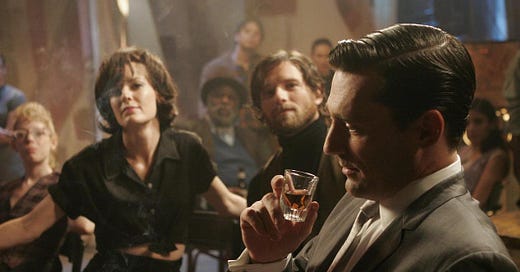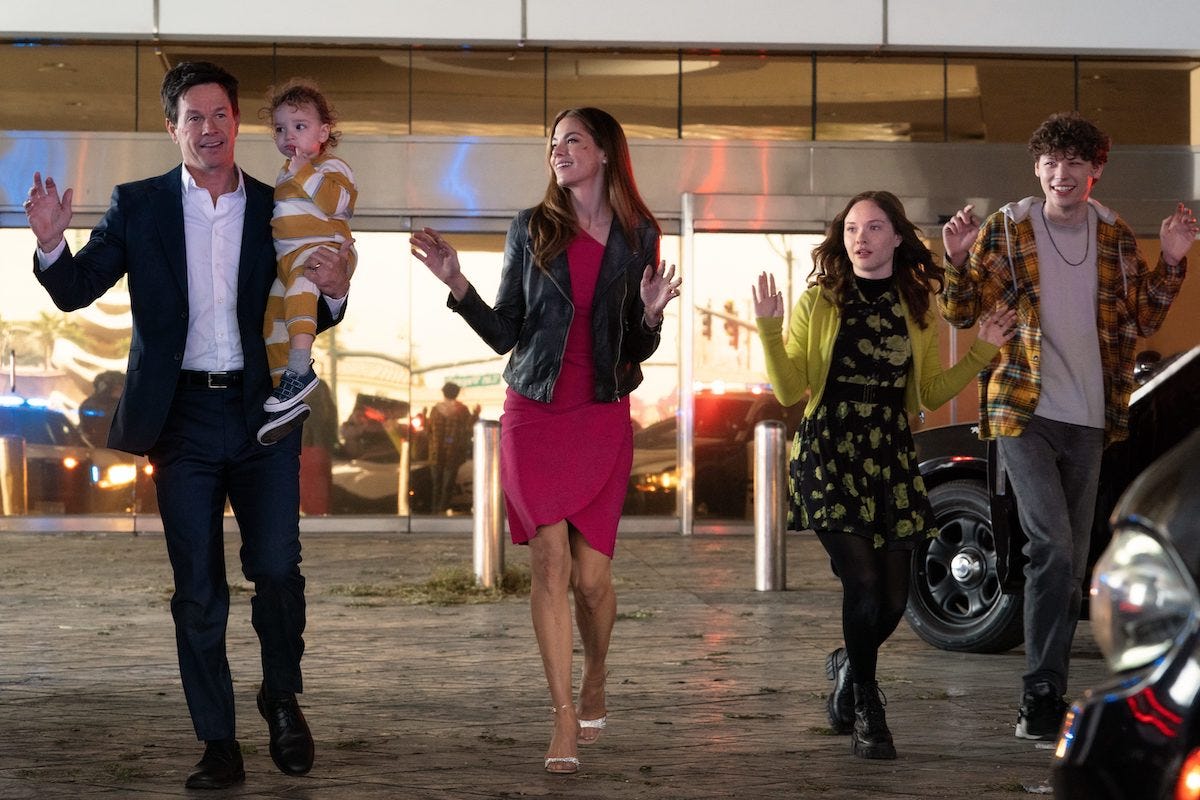How Technology Built the (Ad-Free) Golden Age of TV
Plus: A 'Family' Assignment!
One of the points hammered home repeatedly in Peter Biskind’s book on the new golden age of television, Pandora’s Box, is how freedom from advertisers led to freedom for creatives. Part of this story is the cable revolution and the newfound ability to circumvent airwaves. HBO was able to push boundaries with shows like Oz (which featured copious amounts of prison rape and racist invective) and then The Sopranos (which featured, well, just about everything) because it derived revenue from hungry consumers rather than timid advertisers.
But the rise of basic cable is, in my opinion, even more interesting and the real reason the new golden age turned into a new golden glut. One of the stories Biskind recounts involves an exec for the fledgling network FX showing the pilot of The Shield to a group of advertisers, who promptly fled the room when presented with a program in which a mildly racist cop shoots an undercover officer in an effort to cover up his own crimes. But FX didn’t need to count on advertisers to make their show profitable: they generated 25 cents per cable subscriber per month just by dint of being offered up as part of the cable bundle.
The effect of the cable bundle is the most important—and underappreciated—element of the new golden age of TV. If you’re in, say, a hundred million homes and you’re getting a quarter a month for being there, that’s around $300 million in revenue to play with before a penny in advertising rolls in. Now, $300 million isn’t a ton of money in the grand scheme of things, but it’s enough to gamble $20 million on a season of TV in the hopes that that season will make your network indispensable. Once your network is indispensable, you can raise the rates, generating more revenue and allowing you to make more shows. And once you can raise the rates, the cable companies are faced with the choice of passing that cost on to the viewer or cutting the channel entirely, which in turn leads to threats of cancellation from people who are made they can’t watch the new season of The Shield or Mad Men (AMC) or Battlestar Galactica (SciFi).
The reliance on these affiliate fees also meant that networks could, to a certain extent, blind themselves to the effect of TiVo and other DVR-based services, which allowed consumers to skip past ads. The introduction of cable—which allowed networks like HBO to circumvent FCC restrictions on language and nudity—was the first big technological leap that enabled the golden age of TV. But it was the TiVo revolution that helped turn basic cable viewing into something like HBO viewing. I remain convinced that the DVR revolution’s impact was twofold, and each fold is almost equally important: in addition to allowing time-shifting (that is, the ability to watch a show whenever you wanted rather than whenever it aired), it also allowed viewers to fast forward through ads.
This is not to say that the basic cable networks didn’t like the money that came with these shows; one of the funnier stories from the new golden age is how expensive ads on Mad Men became despite the show’s low overall viewership numbers as advertising companies competed with each other for spots on the show highlighting their profession. Overall, however, reducing the importance of advertisements and advertisers improved the overall quality of television by allowing for a modicum of controversy. As we’ve seen in the case of Twitter, advertisers don’t want to market their wares next to controversial figures. There’s no upside to having Cheerios advertised next to some loon calling for the reimposition of slavery or whatever nonsense Elon’s paid blue checks are up to. Similarly, you don’t want to risk marketing Alpo right after Frank Underwood (Kevin Spacey) smothers a dog in the opening scene of House of Cards.
I can’t help but think that it’s no coincidence the new golden age of TV is drawing to a close at roughly the same time streaming services become more and more reliant on advertising revenue—and during which there is no DVR equivalent to help people skip the ads. Advertising works best with shows that have mass market appeal. Shows that have mass market appeal are CSI and NCIS and the Law and Orders and the Chicagos and the 911s. A reversion to an advertising-based economic system suggests those, and not The Sopranos, are the future of streaming.
Speaking of The Sopranos, on Across the Movie Aisle this week we discussed WBD’s decision to post 25-second clips of every episode of the show on TikTok to entice youths to watch the show. KIDS THESE DAYS. And make sure to check out our bonus episode on debut features, tied to Cord Jefferson’s American Fiction.
Links!
The future of streaming was the topic of conversation with Brandon Katz from Parrot Analytics on The Bulwark Goes to Hollywood last week. It’s kind of funny how quickly we’re rushing toward replacing the broadcast networks with a bunch of similarly minded streaming networks.
My review of The Beekeeper went up on Monday. I couldn’t wait to drone on about this movie; I was practically buzzing with anticipation. We’re going to be talking about it on Across the Movie Aisle this week; I have high hopes the Sonny-Peter-Alyssa hivemind digs it.
S. Craig Zahler—who wrote and directed Bone Tomahawk, Brawl in Cell Block 99, and Dragged Across Concrete between 2015 and 2018 and hasn’t released anything since—said on his Goodreads page that he has a new movie announcement coming soon. I’m very excited for this news; his first three films are about as good as anyone’s, though very much not for the faint of heart.
A weird box office factoid that might be a record of some sort: In its 18th day of release, Anyone But You hit number one at the daily box office for the first time. I asked Scott Mendelson if this—a wide-release movie hitting number for the first time after this long into its release—had ever happened before on a movie that opened on more than 2,000 screens, and he wasn’t sure. But he did note that no other movie that had opened on more than 2,000 screens has ever increased its box office in its second AND third weekends. Will it be four in a row for the little romcom that could? We’ll see after this weekend.
The great Walter Hill (The Warriors, Streets of Fire) celebrated his 84th birthday this week; please enjoy this essay by Sheila O’Malley on the use of costuming in Walter Hill’s films and how they help convey the odd specificity of the worlds he created.
Assigned Viewing: ‘The Family Plan’ (AppleTV+)
You’ll want to watch it before listening to The Bulwark Goes to Hollywood this week! That’s all I’ll say.







The golden age of commercial skipping never happened. I know this because my ex was an engineer for Sonic Blue in the 90s. SB had a DVR that implemented automated commercial skipping. For a year or so, we never saw an ad. Not one; it worked that well. Tivo's never came close. It even had a Super Bowl mode that allowed you to watch just the ads. If there ever was a perfect TV viewing tech, Sonic Blue had it. But the ad agencies and TV networks killed it along with the company, so it was never fully commercialized. PC if you are a Bulwark member, I still remember how great your alg was. :)
Gods dammit, now I need to go back and re-watch Battlestar Galactica because that show was just phenomenal. No laser swords, blasters, phasers, or aliens. Just Marines with M-16s and grenades up against robotic warriors. Starfighters that use bullets. Capital ships with flak guns, torpedoes, and nuclear warheads. And space battles that actually acknowledge the frakin zero G environment they fought in.